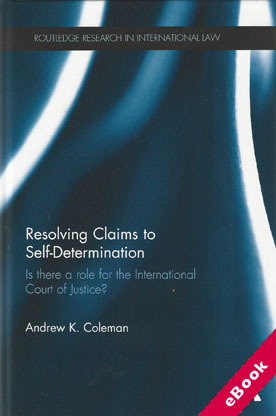
The device(s) you use to access the eBook content must be authorized with an Adobe ID before you download the product otherwise it will fail to register correctly.
For further information see https://www.wildy.com/ebook-formats
Once the order is confirmed an automated e-mail will be sent to you to allow you to download the eBook.
All eBooks are supplied firm sale and cannot be returned. If you believe there is a fault with your eBook then contact us on ebooks@wildy.com and we will help in resolving the issue. This does not affect your statutory rights.
Since the end of World War Two and the formation of the UN, the nature of warfare has undergone changes with many wars being 'intra-state' wars or wars of secession.
Whilst wars of succession do not involve the same number or type of combatants as in the last two World Wars, their potential for destruction and their danger for the international community cannot be underestimated.
There are currently many peoples seeking independence from what they perceive as foreign and alien rulers including the Chechens, West Papuans, Achenese, Tibetans, and the Kurds. The break-up of Yugoslavia and the former USSR, together with recent conflicts in South Ossetia, reveal that the potential for future wars of secession remains high.
This book explores the relationship between recognition, statehood and self-determination showing how self-determination continues to be relevant beyond European decolonisation. The book considers how and why unresolved questions of self-determination have the potential to become violent, arguing that violence is more likely because there are currently no clear and fair ways to peaceable determine how claims for self-determination should be decided.
The book then goes on to investigate whether the International Court of Justice, as the primary judicial organ of the United Nations could successfully resolve questions of self-determination through the application of legal analysis and principles of international law. The book assesses whether the ICJ is a suitable forum, looking at the strengths and weaknesses of the Court's advisory jurisdiction, as well as how effective the Court is in view of the absence of any international police force or enforcement powers.
The issue of whether the ICJ's jurisdiction in its current form will permit people to access the Court's jurisdiction to claim for self-determination is considered along with what changes would need to be made in order for it to provide an effective means for the peaceful "birth" of States.